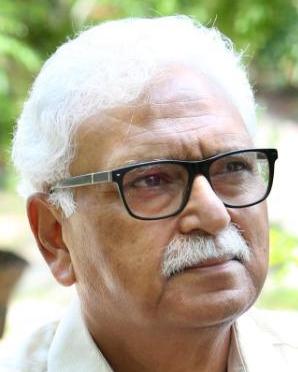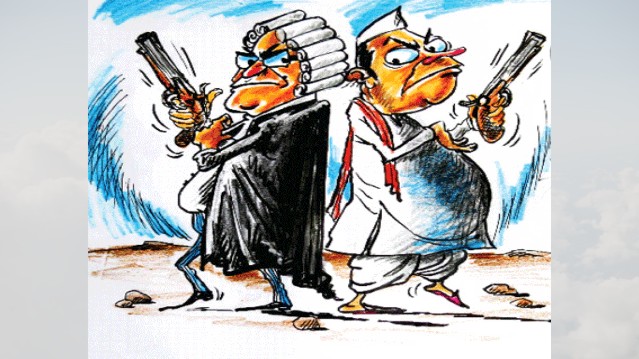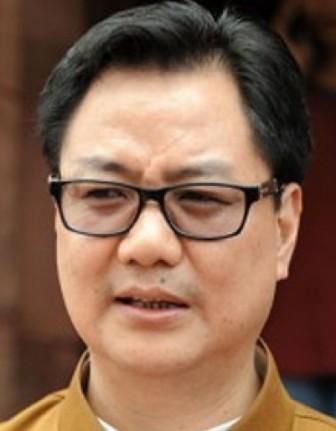

The escalating logjam between the judiciary and the executive over appointment of judges is a matter of serious concern.

It appears that the government, represented by union law minister Kiren Rijiju, is bent upon curtailing the powers of the Supreme Court collegium for appointment of judges.
The public spat between the government and the judiciary is eroding public confidence in the two most important institutions in the country.
It is no secret that the Bharatiya Janata Party led central government had been on an overdrive to control various institutions, including appointments to constitutional posts and even key appointments across the board.
Parliament itself has lost its role for debates and discussions of legislative affairs. Large sections of media too have capitulated either to threats or doling out favours.
Also Read: Centre vs Collegium: Truth Becomes a Casualty
Now the concerted attack on judiciary and its powers to appoint Supreme Court and High Court judges has led to fears that the government might attempt to push for appointments of those aligned to a particular ideology.
It would indeed be a sad day if the government is able to have its way. In effect it has already been delaying appointments recommended by Supreme Court collegium.
In some cases the inordinate delay has resulted in judges recommended for appointment attaining retirement age or otherwise becoming ineligible for appointment.
 The government apparently is not satisfied with its power to stall appointments, and the fact that it had been coming under criticism from the Chief Justice of India and the general public has led it to demand more say in the appointments.
The government apparently is not satisfied with its power to stall appointments, and the fact that it had been coming under criticism from the Chief Justice of India and the general public has led it to demand more say in the appointments.
The union law minister has even recommended that a nominee of the government should be made a member of the selection committee for appointment of judges.
The idea has been shot down by the Chief Justice and has been criticised strongly by almost all jurists and analysts.
In the latest push back by the judiciary, it has put out in the open the objections by the government on three appointments. These included an objection by the government on appointment of an openly declared gay judge.
Also Read: ANY GAY JUDGES IN THE INDIAN JUDICIARY?
The move reflected the eroding patience of the judiciary with the stalling of appointments by the government. However it was selective and refrained from making public objections by the government in all such cases which are pending a decision for a long time.

Yes it must be said that the higher judiciary itself, and particularly the collegium which selects judges and recommends names for appointments, must also record reasons for rejecting the claims of some judges and be fair in giving representations to various categories of the society.
According to the official information shared with the Parliamentary standing committee on law and justice, 79 per cent of new high court judges appointed during the last five years belonged to the upper castes while the representation for Scheduled Castes and minorities was mere two per cent.
Also Read: The Collegium – A sleight of hand
The ministry was not able to ascertain the social background of some judges. Similarly the representation of females at various levels of judiciary remain inadequate. It is not my case for any kind of reservations in appointment to higher judiciary but to point out that all sections needed to be given adequate representation.

Another point of contention, as also pointed by a retired high court judge Justice RS Sodhi, is that the Supreme Court collegium arbitrarily rejects recommendations sent by collegium of various High Court.
It is argued that the recommendations by high court collegium were also done after due deliberations and yet a large number of such recommendations were rejected without offering any explanation.
Also Read: Collegium’s cloudscape constantly under scanner
Thus evidently all is not well with the collegium system but it is still better, warts and all, than the government of the day getting directly involved with the appointments. This can lead to a very serious trend of appointment of pliable judges who would feel obliged towards the government.
It is undoubtedly a tricky situation and a way forward has to be thought by top judiciary.
Perhaps a committee of former chief justices of India and top legal eagles can come out with an honourable solution. One option could be the involvement of retired chief justices in a panel to select new judges.
 Alternatively a committee comprising the Chief Justice of India, the law minister and the Leader of Opposition could take a final look at the recommendations of the collegium and discuss objections, if any, with regard to any particular recommendation.
Alternatively a committee comprising the Chief Justice of India, the law minister and the Leader of Opposition could take a final look at the recommendations of the collegium and discuss objections, if any, with regard to any particular recommendation.
Another possible way out is the one which the Vajpayee government had proposed but which got stalled after its defeat in the 2004 elections. His government was on the verge of bringing in a bill under which a panel was to be formed for appointment of judges.
The panel was supposed to include three senior most judges of the Supreme Court, a representative of the government and the Leader of Opposition.
Also Read: Keep judiciary away from Govt interference
Let legal luminaries come out with a system to ensure justice for the judges in contention without compromising on the independence of the judiciary. The resolution of the logjam is possible only with mutual consultations rather than airing differences in the public. ![]()
___________
Also Read:
Industrialization versus Environmental Degradation
Centre’s Opaque Auction Rules For Pulses Rip Off Govt Coffers, Help Millers Strike Rich
Need to amend laws like UAPA to provide for punishment for those who slap false cases
Global Arms Trade: Who are the real winners?
Why not 40 pc tickets for women in Punjab and elsewhere?
Punjab – How a deadly cocktail of Agri-Water-Energy nexus going to destroy it?
North Pole and the ideological conflict of RSS & Hindutva
Politics of Symbolism: Dalit Chief Ministers in India

Disclaimer : PunjabTodayTV.com and other platforms of the Punjab Today group strive to include views and opinions from across the entire spectrum, but by no means do we agree with everything we publish. Our efforts and editorial choices consistently underscore our authors’ right to the freedom of speech. However, it should be clear to all readers that individual authors are responsible for the information, ideas or opinions in their articles, and very often, these do not reflect the views of PunjabTodayTV.com or other platforms of the group. Punjab Today does not assume any responsibility or liability for the views of authors whose work appears here.
Punjab Today believes in serious, engaging, narrative journalism at a time when mainstream media houses seem to have given up on long-form writing and news television has blurred or altogether erased the lines between news and slapstick entertainment. We at Punjab Today believe that readers such as yourself appreciate cerebral journalism, and would like you to hold us against the best international industry standards. Brickbats are welcome even more than bouquets, though an occasional pat on the back is always encouraging. Good journalism can be a lifeline in these uncertain times worldwide. You can support us in myriad ways. To begin with, by spreading word about us and forwarding this reportage. Stay engaged.
— Team PT


Copyright © Punjab Today TV : All right Reserve 2016 - 2026 |